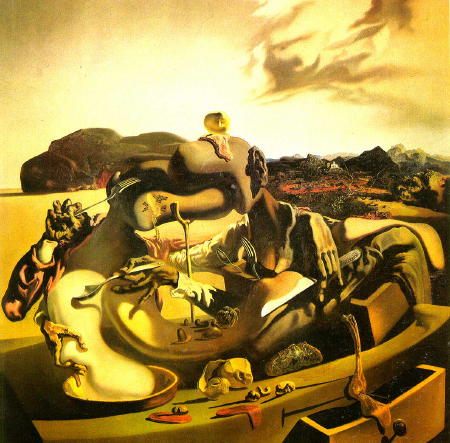





|
|
|
|
October 26, 2006
fine young autumn for nature's cannibals
"Take this country back by force!" While the phrase brings only 13 Google hits, earlier I heard a man say that, and while he might have merely been venting because of a bad hair day, he sounded awfully serious. (There are so many assumptions within the demand that if I wanted to analyze it I wouldn't know where to begin.) I know it sounds nutty to be worred about civil war, but sometimes I think it's the nature of man. Not just in the nature of Iraqis, Chileans, Bosnians, Salvadorans, etc. Chester's "Autumn of the Patriarch" post (about Frederick Turner's piece on Iraqi death squads), made me think again about Dali's "Soft Construction with Boiled Beans" painting. Here's Chester: Turner believes that death squads are a sort of primeval slime from which governments emerge. But might they not also be the maggots that feast on their corpses? Perhaps the true victim of such squads and other proxies is the state itself, so long the leviathan that its demise is now both impossible to imagine and futile to escape.(Via Glenn Reynolds.) However, and much as I hate to be a relativist, considering the number of people killed by governments (156,000,000 in the 20th Century), perhaps even civil war needs to be seen in perspective. Or is that a distinction without a difference? Whether it's civil war or a government killing its citizens, such slaughters are usually perpetrated by one group of people killing another group of their fellow countrymen. Whether it's the government that's doing the killing or a faction that wants to become the government, when citizens of a country massacre each other, it's metaphorically cannibalism. And speaking of both autumn and cannibalism, here's Dali's "Cannibalism in Autumn":  Painted shortly after the Soft Construction/Premonition painting, it's a continuation of Dali's treatment of the civil war theme. While the topic at hand was obviously the Spanish Civil War, Dali was thinking about the bigger picture, including natural history. Dali offered a much criticized explanation of the painting: "These Iberian beings devouring each other in the autumn express the pathos of civil war considered as a phenomenon of natural history, as distinct from Picasso, who considered it a political [phenomenon.]"Hmmm.... Is politics an excuse for cannibalism? I guess it depends on who's eating whom. Yesterday I spent a couple of hours seeing the Franklin Institute's Darwin exhibition, and I can't stop thinking about one of his observations: "Man tends to increase at a greater rate than his means of subsistence; consequently he is occasionally subjected to a severe struggle for existence, and natural selection will have effected whatever lies within its scope."I'd hate to think mass slaughter of human beings might be grounded in natural law. That might lead to people to hate natural law, man's nature, Darwin, or even God. But it wouldn't stop the process. As Trotsky is reported to have said, "you may not be interested in war, but war is interested in you." posted by Eric on 10.26.06 at 01:41 PM |
|
March 2007
WORLD-WIDE CALENDAR
Search the Site
E-mail
Classics To Go
Archives
March 2007
February 2007 January 2007 December 2006 November 2006 October 2006 September 2006 August 2006 July 2006 June 2006 May 2006 April 2006 March 2006 February 2006 January 2006 December 2005 November 2005 October 2005 September 2005 August 2005 July 2005 June 2005 May 2005 April 2005 March 2005 February 2005 January 2005 December 2004 November 2004 October 2004 September 2004 August 2004 July 2004 June 2004 May 2004 April 2004 March 2004 February 2004 January 2004 December 2003 November 2003 October 2003 September 2003 August 2003 July 2003 June 2003 May 2003 May 2002 See more archives here Old (Blogspot) archives
Recent Entries
• War For Profit
• How trying to prevent genocide becomes genocide • I Have Not Yet Begun To Fight • Wind Boom • Isaiah Washington, victim • Hippie Shirts • A cunning exercise in liberation linguistics? • Sometimes unprincipled demagogues are better than principled activists • PETA agrees -- with me! • The high pitched squeal of small carbon footprints
Links
Site Credits
|
|
It seems like a lot of people are getting bogged down in the silly question: "Is the war in Iraq a 'Civil War'?" I think this is because most Americans think of the American Civil War when they hear the term 'civil war'. In the American Civil War, there were 2 governments, each with its own army. What is going on in Iarq is not like that kind of civil war. However, many civil wars are not so neat. Many civil wars have multiple factions fighting, like the Mexican civil War, which Mexicans call 'The Revolution." That civil war went on from around 1910 to 1920, and a million people were killed. It was a messy civil war, with many factions. I think Iraq is in a civil war, a messy one, but still a civil war.